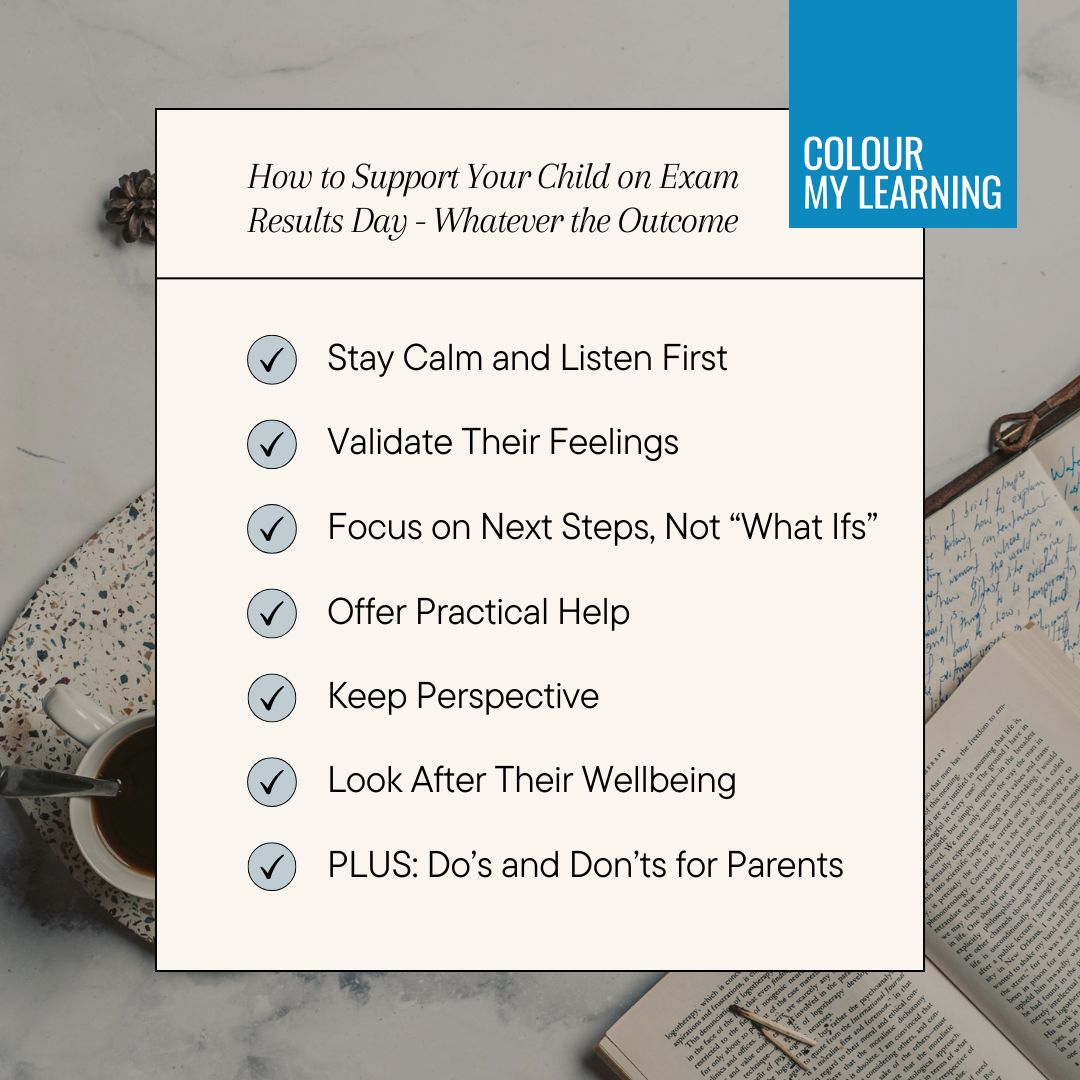How to Support Your Child on Exam Results Day Whatever the Outcome
Exam results day is a big milestone for students and their families. It can bring excitement, relief, pride, or disappointment, sometimes all in the same morning. As a parent or guardian, your reaction will shape how your child feels about themselves and their future.
Whether the grades are higher, lower, or exactly what they expected, it is your support that matters most. Remember that your child’s results do not define their worth nor set the limit on their potential. What matters is how they feel, what options available to them, and helping them build the confidence to take their next steps.
Here are eight practical, compassionate ways to guide your child through results day, whatever the outcome.
1. Stay Calm and Listen First
The first few minutes after your child opens their envelope or email are crucial. Even if you feel anxious or frustrated, pause, take a breath, and let them share their thoughts before you say anything.
Imagine this: your child looks upset, clutching their results. Instead of rushing in with questions or quick fixes, you simply sit beside them, maintain steady eye contact, and say, “Talk me through what’s on your mind.” This shows you are present, calm, and ready to listen.
You might also try:
“Tell me how you’re feeling right now.”
“What’s the first thing you thought when you saw your grades?”
Your calm presence will help them regulate their emotions. Listening without interrupting allows them space to process what has happened and builds their trust in knowing that you are there to help them, not to judge them.
2. Validate Their Feelings
Results day can be an emotional rollercoaster. Some students feel proud and relieved, others shocked, disappointed, or even numb, and sometimes all those emotions arrive at once.
Validation is about recognising their feelings without minimising or exaggerating them. You could say:
“I can see how much this means to you.”
“It’s okay to feel upset right now. I’m here for you.”
“You worked hard, and it’s normal to feel all sorts of things today.”
Acknowledging their emotional reality makes it easier for them to move forward. It also reassures them that their feelings are valid, whatever the results say on paper.

3. Focus on Next Steps, Not “What Ifs”
It’s easy to get stuck thinking about what could have been, but that energy is better spent looking at what can happen next. Once they’ve had time to breathe, guide the conversation towards the future.
If emotions are running high, suggest a short break first, make a cup of tea, take a walk, or simply step outside together before talking through options.
Ask forward-looking questions like:
“What do you want to explore from here?”
“Which options feel most interesting right now?”
“Would you like to look into a gap year or alternative course?”
Taking even one small action — like bookmarking possible courses or contacting a teacher — can help them shift from feeling stuck to feeling proactive.
4. Offer Practical Help
Once the emotional dust has settled, practical support can make all the difference.
Immediate Actions (Same Day)
- Help them research UCAS Clearing or alternative courses.
- Offer to sit with them while they make calls to universities or employers.
- Encourage them to speak with a teacher or careers adviser before making big decisions.
Ongoing Actions (Following Days)
- Explore gap year opportunities for travel, work, or skill development.
- Look into apprenticeships, foundation degrees, or online courses as alternative routes.
- Help them map out a timeline for next steps so they feel less adrift.
Your role is to guide, not take over. You might even role-play a Clearing phone call with them so they feel more confident.
5. Keep Perspective
Exam results can open and close doors, but they never decide the whole story. Many successful people found their way through unexpected paths.
Perhaps your child misses their first-choice university offer but finds an alternative through Clearing that they later realise suits them better. Or they choose an apprenticeship and gain real-world experience that sets them apart later. Sometimes, a change of plan becomes the perfect fit.
Remind them that resilience, adaptability, and curiosity will matter far more than a single set of grades.
6. Look After Their Wellbeing
Results day can affect students in ways that aren’t always obvious, disrupted sleep, loss of appetite, withdrawing from friends. Keep communication open and watch for subtle changes in mood or behaviour.
Encourage activities that help them recharge — whether that’s a sport they enjoy, a day trip, creative projects, or simply spending time with friends. Balanced sleep, good meals, and fresh air will help restore perspective.
For more ongoing support, explore our Mental Health and Wellbeing Hub, a collection of resources designed to help students through high-pressure moments.
7. Do’s and Don’ts for Parents on Results Day
Even with the best intentions, it’s easy to slip into habits that add pressure. Keep these in mind:
Do
- Stay calm and listen before reacting
- Validate their feelings, whatever they are
- Focus on options and next steps
- Offer practical help with research and calls
- Remind them there are many paths to success
Don’t
- Compare them to siblings or friends
- Downplay their emotions (“It’s not a big deal”)
- Dwell on mistakes or past decisions
- Take over and make all the decisions yourself
- Make it solely about grades or prestige
Setting these boundaries helps protect both your relationship and their sense of agency.

8. In the Days After Results Day
The days after results day can be quieter emotionally but busier practically. It’s the perfect time to:
- Attend open days or virtual university tours.
- Book a careers guidance appointment.
- Encourage them to speak with friends or peers in similar situations.
- Help them set small, achievable goals to keep moving forward.
- Revisit their plan after a week to make sure they still feel good about the path chosen.
Small, achievable goals will help them keep moving forward with confidence.
Useful Links
- Why Your Exam Results Don’t Define You
- Should You Take a Gap Year? How to Decide and Make It Work
- How to Prepare for Clearing: A step-by-step guide
Believe in the Future
On results day, the most important thing your child will remember is how you made them feel. Stay calm, offer reassurance, and believe in their future and they will carry that confidence far beyond the grades they receive.
If you find this article useful, please help us share it on.











